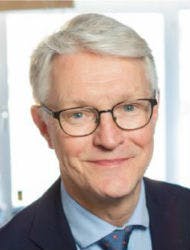Sarcopenia and frailty – preventable and treatable geriatric syndromes
Hent præsentation
Hent præsentationen fra fagkongressen
Beskrivelse af oplægget
Frailty and sarcopenia emerge as threats for independence and survival during ageing. Resistance exercise, healthy food, adequate protein intake, sometimes nutritional supplementation and perhaps anabolic drugs may increase quality of life and postpone disability and mortality.
Early identification of sarcopenia and frailty, i.e. loss of muscle mass, function, and reserve capacities is needed for initiating preventive training and nutrition measures in older people. Ageing, catabolism induced by disease, sedentarism and undernutrition are risk factors. The etiology is multifaceted, thus treatment needs to be multi-modal.
Progressive resistance training (PRT) is first-line prevention/treatment and increases muscle power by enhancing muscle protein synthesis, by reducing inflammation and increasing mitochondrial biogenesis.
Healthy food patterns high in unsaturated fats, complex carbohydrates, whole-grains and anti-oxidant rich fruits, vegetables and drinks are associated with less risk of frailty. Among nutrients proteins and essential amino acids appear to have the strongest effects on muscle maintenance. Observational studies indicate that protein intakes >1.2 g kg/body weight/day are related to preserved muscle mass, reduced risk of mobility limitations as well as to reduced risk of frailty.
For PRT the ceiling/maximum effect on muscle is reached only after quite high loads during longer periods of time, whereas intervention studies indicate that extra effects on muscle by nutrition are difficult to reach beyond adequate nutritional intakes. Nutrients like essential fatty acids; i.e. omega-3 and omega-6 fatty acids, and vitamin D are also likely to have muscle anabolic effects.
For the future pharmacological drugs may become a third treatment option. Current focus is on myostatin antibodies, selective androgen receptor modifiers (SARM) and ghrelin agonists.
Combined therapy including aerobic and resistance exercise, nutrition and perhaps complementary drugs is a potential remedy for sarcopenia and frailty.
Tommy Cederholm

Tommy Cederholm is professor of clinical nutrition at Uppsala University, Sweden, with research focus on energy, fat and protein interactions with disease and ageing. He is an MD and board certified in internal medicine and geriatric medicine and part-time senior consultant in geriatrics. He has been treasurer of ESPEN and active in international initiatives to promote the concept of sarcopenia. He has co-authored about 230 peer-reviewed papers.
Tommy Cederholm deltager også i symposiet om sarkopeni: Assesment and management of Sarcopenia.
